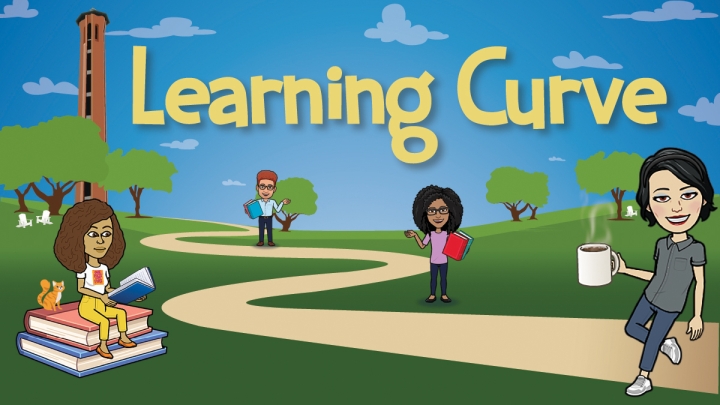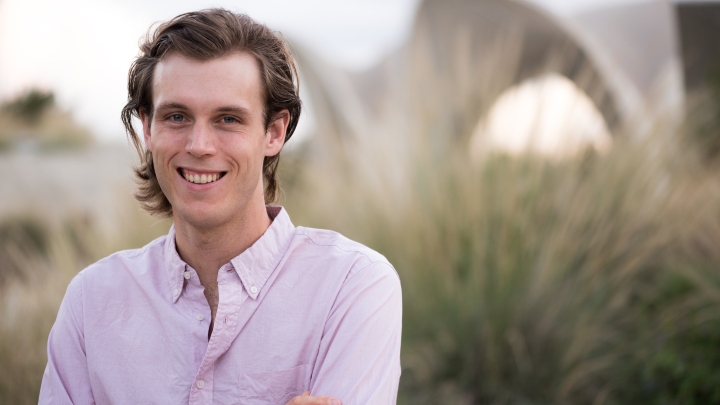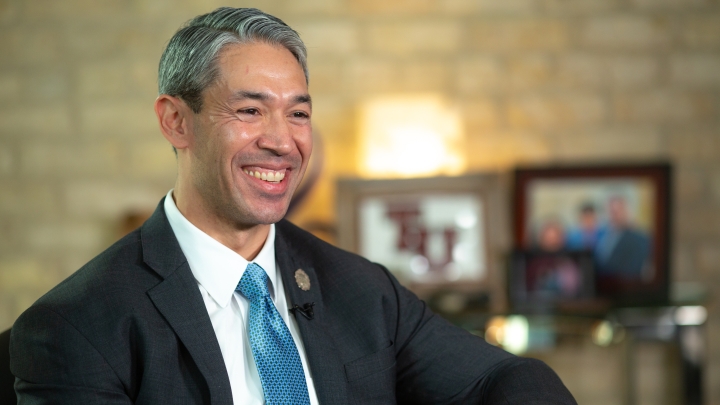
Kristin Raja ’10 cares deeply about climate change, but her outlook is less “doom-and-gloom” and more “let’s get it done.”
“The Trinity engineering degree is a degree in problem solving,” says the commissioned officer serving in The National Oceanic and Atmospheric Administration (NOAA), which explains her focus on what can be done right now for climate change.
“That’s what I’m doing all the time,” says Raja, an engineering science major and environmental science and mathematics minor who is serving at the Channel Islands National Marine Sanctuary off the coast of Santa Barbara, Calif. The marine sanctuary is a place where scientists flock for its diverse ecosystem at the convergence of major ocean currents. She coordinates operations of the protected habitat.
Her job, simply put, is to “facilitate science,” she says. Raja coordinates logistics and safety surrounding the research projects happening at the sanctuary (location, equipment, crew, logistics, safety needs) so the scientists can focus on the science.
“The Channel Islands is a transition point for marine life, which makes it very, very rich,” she says about the delicate environment. “It’s a special place we try to conserve and understand.”
In 2012, Raja joined the NOAA Commissioned Officer Corps, a Uniformed Service working for NOAA within the U.S. Department of Commerce. As a service member, she works for the nation’s authority on the conditions of oceans, major waterways, and the atmosphere.
This was not always her career path, though. A former swimmer and water polo player, Raja initially wanted to be a rescue diver. She looked to the military for opportunities to serve.
“But when I talked to the Navy and the Coast Guard, neither let their officers jump out of helicopters,” she says.
Today she is a certified NOAA Rescue Swimmer, should they ever need her.
In 2019, Raja embarks on a professional development initiative that aligns with her propensity for seeking extreme conditions: the Antarctic.
She applied and was accepted last year to the Homeward Bound Leadership Initiative, making her one of 95 women in STEM around the world selected to participate in the prestigious development program in 2019.
Homeward Bound aims to build a network of women in STEM fields, with the intent to positively influence policy making and decisions that impact the environment.
When she spotted the program, Raja recalls thinking, “Amazing. I can do leadership development with other women in STEM fields.”
For her, developing leadership skills alongside her STEM peers is invaluable.
“I could learn from the others, share what I’m doing, and collaborate,” Raja says.
According to recent data, women are underrepresented in leadership positions despite making up nearly half of the global workforce, and more than half of all recent college graduates are women. In 2018, less than five percent of Fortune 500 CEOs were women.
“A strong purposefully developed network, we will enhance [women’s] ability to impact policy and decision-making for a sustainable future,” Homeward Bound’s program materials say. The 11-month course is delivered via monthly video conference calls and small-group meetings.
“Homeward Bound is all about learning to be visible, learning to raise your voice with respect to environmental concerns, and to contribute back to society,” Raja says.
The Homeward Bound Leadership Initiative culminates in a three-week excursion to the Antarctic where she and other female STEM professionals will unplug from their busy lives, focus on themselves, and nurture their budding community.
Raja says Antarctica’s remoteness only helps to deepen the connections she and other Homeward Bound participants are making.
“Antarctica is a dramatic backdrop. You can see the effects of climate change with your own eyes,” she says.
A self-proclaimed “loud introvert,” Raja was drawn to the Homeward Bound Leadership Initiative because of its insistence on raising voices among women in STEM.
“For me, that has meant starting a blog as a first step to being visible and sharing with others what I care about,” Raja explains. The blog is her way to speak up about her passion and activism around protecting the Earth’s environment.
When asked how she envisions the path toward a healthier environment, she says, “I see a lot of people working together to make changes right where they are, in their own communities.”
It’s a mindset she says was cemented during a Trinity course on economics and the environment, taught by Richard Butler.
Raja recalls examining environmental studies that showed how well-intended actions to clean up the environment (such as banning a hazardous chemical) can have unintended negative and costly repercussions.
“I don’t like the ‘just ban something’ approach,” she says. “Instead, how can we make a huge shift by changing the incentives a little bit? To make a societal shift you need to tweak those factors, not rely on everybody to be a good person.”
Read about Kristin’s journey on her blog at BuildingASustainableFuture.com.


